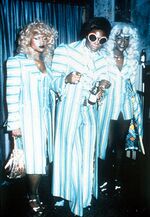Kwanzaa/Classic
“And Hallmark thought it would clean up on Easter!”
Kwanzaa is a holiday that was created for African Americans because they didn't have one of their own. (Except Martin Luther King Day, but that's for everyone.)
Kwanzaa keeps people of African origin from feeling left out around Christmas time if they refuse to be Uncle Toms and celebrate Whitey's holiday. During Kwanzaa, black people dress up in clothes that don't match and dance around senselessly. This is very unusual.
Kwanzaa has its own flag (pictured). To celebrate all the diversity of the holiday, it contains all the colors of the rainbow, excepting orange, yellow, blue, pink, purple, and gold. And it adds black for good measure, of course. The remaining colors are surely used by some flag somewhere and thus haven't been shortchanged.
The colors of the Kwanzaa flag are deeply symbolic. They symbolize Kwanzaa. To avoid confusion, the same flag is the national flag of two separate sub-Saharan countries. And they don't mind a bit.
Kwanzaa can be spelled in many different ways, not unlike the given names of black newborns. Blacks who have embraced Islam often begin the word with a Q, because it seems vaguely appropriate. Apostrophes are sometimes inserted into the name, either for dramatic effect or because the writer has a nervous tic.
History[edit]
Originally, African Americans had Black History Month, which lasted all of February. Now, February is an unusually short month, but there is not a lot of history when you spend half the existence of the United States in shackles harvesting cotton. Fortunately, enough black history has been invented to keep the nation's grade-schoolers busy all month.
The inventor of Kwanzaa[edit]
Kwanzaa was invented by an anti-war professor from California named Maulana Karenga. He said his goal was to "let Blacks celebrate rather than simply imitate the dominant society."
He precluded imitation mostly by plunking it at the end of December and adopting a candlestick icon--the Kwanzaalabra--that suspiciously resembles a menorah. The candlestick employs an orange block of wood, which has nothing at all to do with a tefillin, with eight black candles, each one lit on a successive day--a thoroughly novel concept.
The date Prof. Karenga chose is not the birthday of Kwanzus, but this is unimportant, as Christmas has been shown to not exactly be the birth of Jesus either.
The invention of Kwanzaa coincided with the black nationalist movement of the 1960s, in which African Americans resolved to become full members of the American nation by not having anything to do with any of the other members. In the early days, Prof. Karenga made some unfortunate statements, such as that Jesus was psychotic. As Kwanzaa gained adherence, Wikipedia tells us the Professor "altered his position," a triangulation that surely informed Barack Obama, who happens to also be black.
The seven days of Kwanzaa[edit]
Kwanzaa is celebrated from December 26 through January 1 of the following year. This is because no one shows up for work anyway during the slow days between the two holidays. The multi-day holiday was to put even more distance between Kwanzaa and the things the Jews do. It also provides that Kwanzaa outdoes Chanukah by two days.
During each of the seven days, blacks study a separate aspect of how to be truly black. These include:
- Umoja (Unity): The most important aspect of Kwanzaa: To keep talking up Kwanzaa. The white holiday this compares most closely to is Breast Cancer Awareness Day at the ballpark.
- Kujichagulia (Self-Determination): To define ourselves, create for ourselves, and speak for ourselves, all in lockstep Ebonic gobbledy-gook.
- Ujima (Collective Work): To share our brothers' and sisters' problems and solve them together. Like how Tyrone hasn't gotten up before noon since he got on the dole.
- Imani (Credulity): To keep voting Democratic year after year, even when all you get is payments to families when the father leaves to play the field.
Describing everything in a gibberish language that no one knows, or intends to learn, has nothing to do with the Jews either.
What to do on Kwanzaa[edit]
Gifts are often exchanged on Kwanzaa. Shrewdly, most of these are bought after December 25 at post-Christmas sales.
Popular Kwanzaa Carols include I'm Dreaming of a Black Christmas, Oh Kwanzaa Tree, and Oh Little Town of Compton. The Rock 'n' roll genre has produced many Kwanzaa-theme hits, including Jingle-Bell Bling.
Kwanzaa Today[edit]
Kwanzaa's popularity has diminished recently as other, better midwinter holidays have sprung up, some of them even vague and meaningless enough to be celebrated in public schools. These include Festivus, Joyous Solstice, Annual Non-Religious Gift-Giving Day (i.e., Giftmas), Hangover Eve, The Festival of Zorvfus, Chinese Thanksgiving, Death of Autumn Celebration, and The Feast of 1,000 Holidays.
Spike Lee and Hallmark have jointly sponsored Kwanzaa awareness programs. Hallmark benefits from the holiday lull between Christmas and Valentines Day, and Spike Lee got floor seats at a Knicks game from Hallmark (inside one of its "I heard you helped us whore a holiday" cards).
Other Kwanzaas[edit]
Kwanzaa is also a file-sharing web site. It gives black and white alike (not to mention Asians, who are serious computer manics) access to free music without ever entering the record store. Downloading from Kwanzaa lets blacks build their libraries with a simple mouse click, and avoid accusations of shoplifting.
Kwanzaa is also the name of a subcompact sedan by Nissan Motors.
The Kwanza is also a river of Angola. But no one cares about fricking Angola. It's, like, not in America.




